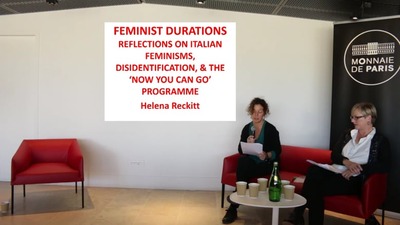Feminist Durations: Reflections on Italian Feminisms, Disidentification, and the 'Now You Can Go' programme
Reckitt, Helena. 2016. 'Feminist Durations: Reflections on Italian Feminisms, Disidentification, and the 'Now You Can Go' programme'. In: Work, Strike and Self-Abolition: Feminist Perspectives on the Act of Creating Freedom. La Monnaie, Paris, France 1 October 2016. [Conference or Workshop Item]
|
Text
Nuit Blanche 2016 _ Monnaie de Paris.pdf - Other Download (170kB) | Preview |
|
![[img]](https://research.gold.ac.uk/19434/6.hassmallThumbnailVersion/Fulvia%20Carnevale%20%26%20Helena%20Reckitt_La%20Monnaie.jpg)
|
Image
Fulvia Carnevale & Helena Reckitt_La Monnaie.jpg Download (44kB) | Preview |
Abstract or Description
This lecture focuses on ‘Now You Can Go,’ a two-week long events programme inspired by Italian feminisms of the late 1960s, 1970s and 1980s that Helena Reckitt initiated and organised with six feminist colleagues in 2015. Foregrounding the implications of what it means to both curate as feminists and to curate feminist content, the talk explores how practices of transmission, translation and annotation operate as means of intergenerational feminist encounter.
Foregrounding Italian feminist’s critique of how work and productivity colonize all aspects of life, Reckitt explores how revisiting tactics developed in the 1970s and 1980s can generate new feminist cultures that might help us to break our complicity with systems that celebrates high-status production while disavowing the feminized labour and collective efforts that sustain them.
Highlighting tactics developed through the activities of small groups and collectives, Reckitt discusses practices of autocosziena, the Italian feminist version of consciousness-raising; affidamento/entrustment, in which women form relationships of entrustment with one another that recognise their differences and disparities; non-assimilationist politics that refuse the assumptions inherent to campaigns for equal rights; and the rejection of expected roles and institutional power that Carla Lonzi termed ‘deculturation,’ which she examined in her book Vai Pure, whose English name, ‘Now You Can Go,’ lent the programme its title.
Reckitt describes how ‘Now You Can Go’ developed out of the Feminist Duration Reading Group on under-known feminisms, especially those from Italy, and discusses how programme elements were led by the members of a programming team.
Considering the generative impact of the programme, Reckitt discusses its autodidactic approach to learning that stems from curiosity and ignorance rather than competence and knowledge. She reflects on some of the programme’s limitations, which highlight the importance of incorporating feminist values into a project that curates feminist content.
Drawing on Italian feminists’ efforts to disidentify with gendered roles, Reckitt asks how we might draw on the tools that they developed in an effort to disidentify from prescribed expectations. For instance, the assumption that work in the cultural and academic fields is undertaken as a labour of love has facilitated the implementation of short-term, zero-contracted, unstable, poorly paid and unpaid work. Women and other feminized subjects take up the slack of under-appreciated, and often unpaid, background work.
Reflecting on the dangers of internalizing the ideology of “labours of love”, Reckitt refers to a discussion she had had with art historian Danielle Childs and curator Jenny Richards, which led them to list some of the exploitative, and self-exploitative, institutional behaviours that they carry out. Reckitt discusses a proposition that she had developed in collaboration with artist Alex Martinis Roe called ‘Productive Refusals,’ which suggests that saying ‘no’ can be a productive way to change existing habits and systems. She relates the effort to unlearn bad habits to the ‘New Habits’ project developed by the team of the CASCO non-profit gallery in Utrecht and the artist Annette Krauss.
The talk considers the practices of artists, theorists and activists including the historical projects of Carla Lonzi, Rivolta Femminile, Milan Women’s Bookshop Collective, Wages For Housework, Teresa de Lauretis, Gayatri Spivak, and Mierle Laderman Ukeles, and contemporary artists, curators and theorists including Sara Ahmed, Claire Fontaine, Kajsa Dahlberg, Laura Guy, Annette Krauss, Angela McRobbie, Gabrielle Moser, and Nina Wakeford.
|
Item Type: |
Conference or Workshop Item (Lecture) |
||||||
| Additional Information: |
The talk was part of a programme ofinternationally recognized feminist intellectuals. “Work, strike and self-abolition. Feminist perspectives on the act of creating freedom” aimed to update the debate on the process of subjectivation in the heart and on the outskirts of the creative process. This questions were discussed in the light of feminist theories that have explored the question of subjectivity and the possibility of establishing non-utilitarian relationships, capable of producing a generalized expansion of the field of art and creation conceived not only as creation of works but as creations of life forms. The proofreading the concept of work and criteria that measure productivity in our society was central to the event; the ratio between the recognized work and the underground and invisible one of everyday life, between production and reproduction (of others and oneself), between the artwork and its absence will be the subject of discussions and explorations from the different interveners. Contributors: Claire Fontaine, Julia Bryan-Wilson, Elisabeth Lebovici, Helena Reckitt, Marina Vishmidt, Giovanna Zapperi. The event coincided with the publication of a special issue of the bilingual French/English journal May Revue, edited by Claire Fontaine, on responses to Italian feminism and the resonance of the Now You Can Go programme. Volume 16, No 10, 2016 |
||||||
| Related URLs: |
|
||||||
| Departments, Centres and Research Units: |
|||||||
| Dates: |
|
||||||
| Event Location: |
La Monnaie, Paris, France |
||||||
| Date range: |
1 October 2016 |
||||||
| Item ID: |
19434 |
||||||
| Date Deposited: |
10 Jan 2017 11:17 |
||||||
| Last Modified: |
05 Mar 2025 22:40 |
||||||
|
URI: |
View statistics for this item...
 |
Edit Record (login required) |

 Tools
Tools Tools
Tools
